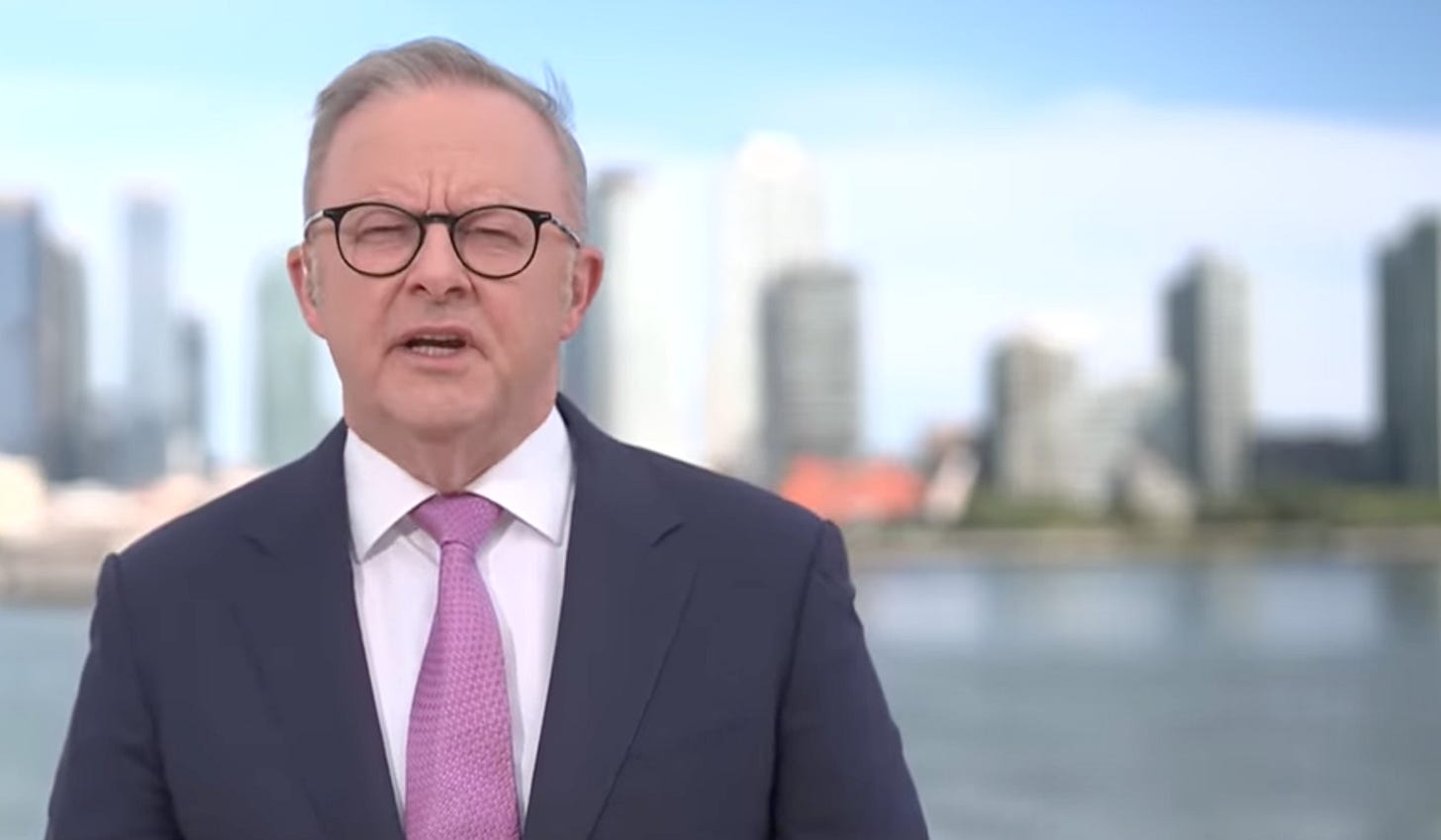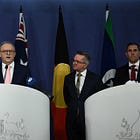Australia Recognizes Palestine as Sovereign State Amid UN Assembly
Today’s Article is brought to you by Empower your podcasting vision with a suite of creative solutions at your fingertips.
This piece is freely available to read. Become a paid subscriber today and help keep Mencari News financially afloat so that we can continue to pay our writers for their insight and expertise.
Australia formally recognized Palestine as a sovereign state Sunday, joining more than 150 countries in the declaration as Prime Minister Anthony Albanese arrived in New York for the United Nations General Assembly.
The announcement came in a joint statement by Albanese and Foreign Minister Penny Wong, with Canada and the United Kingdom making similar declarations in what officials called a coordinated international effort to advance a two-state solution.
"This is the world saying that the cycle of violence has to stop," Albanese said from New York, where he is leading the Australian delegation to the 80th session of the UN General Assembly. "Now is the time. You can't just watch what is unfolding there and not have a response."
The recognition makes Australia one of seven Western countries signaling formal recognition during the UN assembly, with France, Belgium and Portugal among those also announcing their positions this week.
Truth matters. Quality journalism costs.
Your subscription to Mencari directly funds the investigative reporting our democracy needs. For less than a coffee per week, you enable our journalists to uncover stories that powerful interests would rather keep hidden. There is no corporate influence involved. No compromises. Just honest journalism when we need it most.
Not ready to be paid subscribe, but appreciate the newsletter ? Grab us a beer or snag the exclusive ad spot at the top of next week's newsletter.
Australia's declaration states the country "recognises the legitimate and long-held aspirations of the people of Palestine to a state of their own" and reflects "Australia's longstanding commitment to a two-state solution, which has always been the only path to enduring peace and security for the Israeli and the Palestinian people."
The move was previewed in August but became official Sunday, with the practical effect being Australia's recognition of Mahmoud Abbas, leader of the Palestinian Authority, as head of state. Abbas was denied a U.S. visa to attend the UN assembly.
Immediate Changes Outlined
Wong said Australia's initial steps would include updating government documents and communications to refer to the "State of Palestine" rather than the "Occupied Palestinian Territories."
"Further steps will follow, such as establishing embassies to follow progress on reforms committed to by the Palestinian Authority," Wong said. The locations of any future embassies have not been determined.
The declaration outlined "clear requirements" on the Palestinian Authority, which Albanese and Wong said had given direct commitments to Australia, including pledges to hold democratic elections and enact significant reforms to finance, governance and education.
The pair noted the Palestinian Authority's recognition of Israel's right to exist and stated "terrorist organisation Hamas must have no role in Palestine," repeating calls for a ceasefire in Gaza and release of the remaining 48 Israeli hostages held in the strip.
Palestinian Authority Welcomes Move
In the West Bank, Palestinian Authority Foreign Minister Varsen Aghabekian welcomed the announcement but demanded concrete action to help statehood become reality.
"Believing that there can be peace and security in the region without the materialisation of an independent state of Palestine and the achievements of the inalienable rights of the Palestinian people is a delusion," Aghabekian told reporters in Ramallah. "It is clear that recognition of Palestine is a prerequisite for peace and not a by-product."
Aghabekian said conditions for Palestinians in the West Bank were dire, citing increasing attacks by Jewish settlers and plans by the Netanyahu government to expand settlements, which are considered illegal under international law.
Netanyahu Rejects Recognition
Israeli Prime Minister Benjamin Netanyahu condemned the recognition, releasing a video statement shortly after the announcement.
"I have a clear message to those leaders who recognise a Palestinian state after the terrible massacre on October 7: You are giving a huge reward to terrorism," Netanyahu said. "And I have another message for you: It will not happen. A Palestinian state will not be established west of the Jordan River."
Netanyahu said he had prevented establishment of a Palestinian state for years despite pressure and would continue to double Jewish settlement in Judea and Samaria.
Israel has already revoked visas for Australian diplomats working in the West Bank, partly in response to Australia's move toward recognition. Netanyahu previously labeled Albanese a "weak" leader in an extraordinary personal attack.
Coalition Opposition
Australia's federal Coalition restated its objections to the timing of recognition.
"Recognition must come at the end of a peace process, not during the conflict. Palestine has no established borders and no effective government," Opposition Leader Sussan Ley and foreign affairs spokesperson Michaelia Cash said in a joint statement.
The pair described Labor's move as "a hollow gesture of false hope to the Palestinian people" and said it extended "a chilling act of concession to the Hamas terrorists who continue to seek their annihilation" of Israel.
Federal Labor has maintained a longstanding intention to recognize a Palestinian state as part of a peace process, but its stance on timing has shifted during the Gaza war, with recognition now viewed as a step toward peace rather than an outcome of it.
UN Report Cites Genocide
The recognition comes as a UN commission of inquiry found last week that Israel was committing genocide against Palestinians in Gaza. Israeli security forces have directly targeted and killed civilians "in far larger numbers compared to previous conflicts," the commission concluded.
The conflict began after Hamas's deadly attacks on October 7, 2023, which killed around 1,200 people and resulted in 250 taken hostage. The subsequent war in Gaza has killed more than 65,000 Palestinians and left hundreds of thousands displaced.
Albanese told ABC News that expansion of West Bank settlements was among factors that led the world to act.
"We've seen an ongoing expansion of settlements in the West Bank. We have Israeli ministers who completely reject any idea of Palestinians having any future homeland," Albanese said. "And we've seen as well as the humanitarian catastrophe that's unfolding in Gaza."
Broader UN Agenda
France and Saudi Arabia are sponsoring a summit on Palestinian recognition at UN headquarters Monday, the first day of the General Assembly's high-level week.
Australia's position puts it at odds with the Trump administration, which opposes Palestinian recognition despite America's historical support for a two-state solution.
"Our foreign policy isn't determined in Washington, or Beijing, or Wellington for that matter," Albanese said, asserting Australia's sovereign position.
Albanese said the Arab League's recent declaration that Hamas cannot play a role in a future Palestinian state represented a real turning point, noting the League called for Hamas's disarmament and disbandment while condemning the October 7 attacks.
Climate and Technology Focus
Australia will also use the assembly to declare its 2035 emissions target of a 62 to 70 percent reduction on 2005 levels. Energy Minister Chris Bowen, also in New York, called the target Australia's "maximum possible effort" and described it as "ambitious" but "doable."
The prime minister will promote Australia's social media ban for under-16s, which begins in December.
"Australia is leading the world, but the world is following Australia's lead," Albanese said, citing European Union consideration of similar bans.
Australia awaits outcome of a Pentagon review of the AUKUS submarine pact between Australia, the United States and Britain. The U.S. trip will be followed by visits to Britain ahead of APEC and ASEAN summits in Korea and Malaysia in October.
Albanese has not confirmed whether he will meet with President Trump during the visit, though Trump suggested a possible meeting to reporters last week. When asked if Palestine recognition was complicating potential meetings, Albanese simply said: "No, is the answer."
The recognition represents a significant shift in Australia's Middle East policy, moving from conditional future recognition to immediate acknowledgment as the international community seeks new momentum for peace.
Sustaining Mencari Requires Your Support
Independent journalism costs money. Help us continue delivering in-depth investigations and unfiltered commentary on the world's real stories. Your financial contribution enables thorough investigative work and thoughtful analysis, all supported by a dedicated community committed to accuracy and transparency.
Subscribe today to unlock our full archive of investigative reporting and fearless analysis. Subscribing to independent media outlets represents more than just information consumption—it embodies a commitment to factual reporting.
As well as knowing you’re keeping Mencari (Australia) alive, you’ll also get:
Get breaking news AS IT HAPPENS - Gain instant access to our real-time coverage and analysis when major stories break, keeping you ahead of the curve
Unlock our COMPLETE content library - Enjoy unlimited access to every newsletter, podcast episode, and exclusive archive—all seamlessly available in your favorite podcast apps.
Join the conversation that matters - Be part of our vibrant community with full commenting privileges on all content, directly supporting The Evening Post (Australia)
Catch up on some of Mencari’s recent stories:
It only takes a minute to help us investigate fearlessly and expose lies and wrongdoing to hold power accountable. Thanks!







